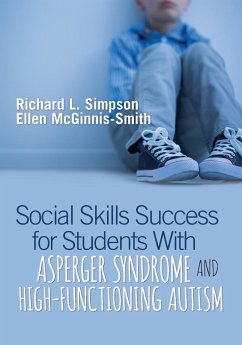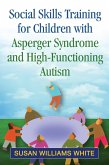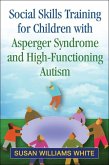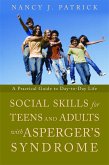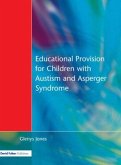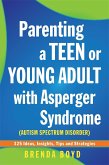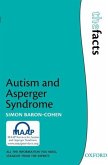Richard L. Simpson, Ellen McGinnis-Smith
Social Skills Success for Students With Asperger Syndrome and High-Functioning Autism
Richard L. Simpson, Ellen McGinnis-Smith
Social Skills Success for Students With Asperger Syndrome and High-Functioning Autism
- Broschiertes Buch
- Merkliste
- Auf die Merkliste
- Bewerten Bewerten
- Teilen
- Produkt teilen
- Produkterinnerung
- Produkterinnerung
This practical resource provides evidence-based strategies for enhancing social skills for children and adolescents diagnosed with high-functioning autism.
Andere Kunden interessierten sich auch für
![Social Skills Training for Children with Asperger Syndrome and High-Functioning Autism Social Skills Training for Children with Asperger Syndrome and High-Functioning Autism]() Susan Williams White (United States Virginia Tech)Social Skills Training for Children with Asperger Syndrome and High-Functioning Autism38,99 €
Susan Williams White (United States Virginia Tech)Social Skills Training for Children with Asperger Syndrome and High-Functioning Autism38,99 €![Social Skills Training for Children with Asperger Syndrome and High-Functioning Autism Social Skills Training for Children with Asperger Syndrome and High-Functioning Autism]() Susan Williams WhiteSocial Skills Training for Children with Asperger Syndrome and High-Functioning Autism93,99 €
Susan Williams WhiteSocial Skills Training for Children with Asperger Syndrome and High-Functioning Autism93,99 €![Social Skills for Teenagers and Adults with Asperger Syndrome Social Skills for Teenagers and Adults with Asperger Syndrome]() Nancy J PatrickSocial Skills for Teenagers and Adults with Asperger Syndrome25,99 €
Nancy J PatrickSocial Skills for Teenagers and Adults with Asperger Syndrome25,99 €![Educational Provision for Children with Autism and Asperger Syndrome Educational Provision for Children with Autism and Asperger Syndrome]() Glenys JonesEducational Provision for Children with Autism and Asperger Syndrome58,99 €
Glenys JonesEducational Provision for Children with Autism and Asperger Syndrome58,99 €![Parenting a Teen or Young Adult with Asperger Syndrome (Autism Spectrum Disorder) Parenting a Teen or Young Adult with Asperger Syndrome (Autism Spectrum Disorder)]() Brenda BoydParenting a Teen or Young Adult with Asperger Syndrome (Autism Spectrum Disorder)25,99 €
Brenda BoydParenting a Teen or Young Adult with Asperger Syndrome (Autism Spectrum Disorder)25,99 €![What Men with Asperger Syndrome Want to Know About Women, Dating and Relationships What Men with Asperger Syndrome Want to Know About Women, Dating and Relationships]() Maxine AstonWhat Men with Asperger Syndrome Want to Know About Women, Dating and Relationships25,99 €
Maxine AstonWhat Men with Asperger Syndrome Want to Know About Women, Dating and Relationships25,99 €![Autism and Asperger Syndrome Autism and Asperger Syndrome]() Simon Baron-Cohen (Dire Professor of Developmental PsychopathologyAutism and Asperger Syndrome18,99 €
Simon Baron-Cohen (Dire Professor of Developmental PsychopathologyAutism and Asperger Syndrome18,99 €-
-
-
This practical resource provides evidence-based strategies for enhancing social skills for children and adolescents diagnosed with high-functioning autism.
Hinweis: Dieser Artikel kann nur an eine deutsche Lieferadresse ausgeliefert werden.
Hinweis: Dieser Artikel kann nur an eine deutsche Lieferadresse ausgeliefert werden.
Produktdetails
- Produktdetails
- Verlag: SAGE Publications Inc
- Seitenzahl: 234
- Erscheinungstermin: 14. Juni 2018
- Englisch
- Abmessung: 254mm x 178mm x 13mm
- Gewicht: 448g
- ISBN-13: 9781544320502
- ISBN-10: 1544320507
- Artikelnr.: 50275038
- Herstellerkennzeichnung
- Books on Demand GmbH
- In de Tarpen 42
- 22848 Norderstedt
- info@bod.de
- 040 53433511
- Verlag: SAGE Publications Inc
- Seitenzahl: 234
- Erscheinungstermin: 14. Juni 2018
- Englisch
- Abmessung: 254mm x 178mm x 13mm
- Gewicht: 448g
- ISBN-13: 9781544320502
- ISBN-10: 1544320507
- Artikelnr.: 50275038
- Herstellerkennzeichnung
- Books on Demand GmbH
- In de Tarpen 42
- 22848 Norderstedt
- info@bod.de
- 040 53433511
Richard L. Simpson was Professor Emeritus at the University of Kansas. He was a member of the Department of Special Education faculty for over 40 years. While at the University of Kansas he directed numerous University of Kansas and University of Kansas Medical Center demonstration programs for students with autism spectrum disorders and other disabilities and coordinated a variety of federal grant programs related to students with autism spectrum disorders and other disabilities. He also worked as a special education teacher, school psychologist and coordinator of a community mental health outreach program. Rich authored numerous books, articles, and texts on a variety of topics connected to students with disabilities. Rich was the former senior editor of the professional journal Focus on Autism and Other Developmental Disabilities. His awards include the Council for Exceptional Children Research Award, Midwest Symposium for Leadership in Behavior Disorders Leadership Award, Autism Society of Kansas Leadership Award, and numerous University of Kansas awards and distinguished roles, including the Gene A. Budig Endowed Teaching Professorship of Special Education.
Preface
Publisher's Acknowledgments
About the Authors
Chapter 1. Understanding Asperger Syndrome and High-Functioning Autism
Autism Spectrum Disorders
Children and Youth With Asperger Disorder and Other Types of
High-Functioning Autism
Social Skill and Social Interaction
Physical and Motor Skill Challenges
Case Example: Stanley
Prevalence
Summary Considerations
References
Chapter 2. Social Challenges and Foundations for Successful Outcomes
Justification for Social Skill Instruction
Challenges to Social Skill Instruction
Strategies for Teaching Social Skills to Children and Youth With HF/AD
A Foundation for Social Skill Instruction
Social Skill Instructional Targets
Summary Considerations
References
Chapter 3. Social Skill and Support Methods for Learners With Asperger
Disorder and High-Functioning Autism
Fundamental Instructional Methods for Children With High-Functioning Autism
Social Skill Instructional Steps for Building Social Skill Capacity and
Social Interaction Competency
Summary Considerations
References
Examples: Social Skill Instructional Targets, Skill Development Steps, and
Evaluation
Chapter 4. Sample Social Skill Development Program
Case Example: Jackson
Category 1: Fundamental Social Interaction, Social Relationship, and
Collaboration Skill Sample Program
Category 2: Self-Advocacy, Self-Management, and Personal Accountability
Sample Program
Category 3: School-Related Social Skills Sample Program
Summary Considerations
References
Chapter 5. Generalizing Social Skills: Challenges and Strategies
Planning for Skill Generalization and Transfer
Planning for Skill Generalization: Role-Playing and Practice
Planning for Skill Generalization: Coaching and Performance Feedback
Planning for Skill Generalization: Practice and Skill Rehearsal in Everyday
Settings
Summary Considerations
References
Chapter 6. Supports for Structuring, Organizing, and Managing Social
Learning
Supporting and Supporting and Promoting Acquisition and Performance of New
Social Skills and Developing Social Interaction Competence
Environmental Modifications and Structuring Procedures
Social Skill Instructional Support Methods
Summary Considerations
References
Chapter 7. Peer Supports
Creating a Foundation of Social Acceptance and Positive Attitudes
Positive Experiences
Peer Recruitment
Using Peers to Create and Display Appropriate Models of Target Skills
Peer Involvement in Role-Play and Practice
Peer Involvement in Coaching and Performance Feedback
Peer Involvement in Assisting Learners to Practice, Rehearse, and
Generalize Social Skills in Natural Settings
Summary Considerations
References
Chapter 8. Parent and Family Involvement and Support
Communication and Collaboration
Facilitating Ongoing Communication, Information Exchange, and Collaborative
Relationships
Building Partnership and Skill Development and Support Relationships With
Parents and Families
Selecting Levels and Types of Parent/Family Involvement
Summary Considerations
References
Index
Publisher's Acknowledgments
About the Authors
Chapter 1. Understanding Asperger Syndrome and High-Functioning Autism
Autism Spectrum Disorders
Children and Youth With Asperger Disorder and Other Types of
High-Functioning Autism
Social Skill and Social Interaction
Physical and Motor Skill Challenges
Case Example: Stanley
Prevalence
Summary Considerations
References
Chapter 2. Social Challenges and Foundations for Successful Outcomes
Justification for Social Skill Instruction
Challenges to Social Skill Instruction
Strategies for Teaching Social Skills to Children and Youth With HF/AD
A Foundation for Social Skill Instruction
Social Skill Instructional Targets
Summary Considerations
References
Chapter 3. Social Skill and Support Methods for Learners With Asperger
Disorder and High-Functioning Autism
Fundamental Instructional Methods for Children With High-Functioning Autism
Social Skill Instructional Steps for Building Social Skill Capacity and
Social Interaction Competency
Summary Considerations
References
Examples: Social Skill Instructional Targets, Skill Development Steps, and
Evaluation
Chapter 4. Sample Social Skill Development Program
Case Example: Jackson
Category 1: Fundamental Social Interaction, Social Relationship, and
Collaboration Skill Sample Program
Category 2: Self-Advocacy, Self-Management, and Personal Accountability
Sample Program
Category 3: School-Related Social Skills Sample Program
Summary Considerations
References
Chapter 5. Generalizing Social Skills: Challenges and Strategies
Planning for Skill Generalization and Transfer
Planning for Skill Generalization: Role-Playing and Practice
Planning for Skill Generalization: Coaching and Performance Feedback
Planning for Skill Generalization: Practice and Skill Rehearsal in Everyday
Settings
Summary Considerations
References
Chapter 6. Supports for Structuring, Organizing, and Managing Social
Learning
Supporting and Supporting and Promoting Acquisition and Performance of New
Social Skills and Developing Social Interaction Competence
Environmental Modifications and Structuring Procedures
Social Skill Instructional Support Methods
Summary Considerations
References
Chapter 7. Peer Supports
Creating a Foundation of Social Acceptance and Positive Attitudes
Positive Experiences
Peer Recruitment
Using Peers to Create and Display Appropriate Models of Target Skills
Peer Involvement in Role-Play and Practice
Peer Involvement in Coaching and Performance Feedback
Peer Involvement in Assisting Learners to Practice, Rehearse, and
Generalize Social Skills in Natural Settings
Summary Considerations
References
Chapter 8. Parent and Family Involvement and Support
Communication and Collaboration
Facilitating Ongoing Communication, Information Exchange, and Collaborative
Relationships
Building Partnership and Skill Development and Support Relationships With
Parents and Families
Selecting Levels and Types of Parent/Family Involvement
Summary Considerations
References
Index
Preface
Publisher's Acknowledgments
About the Authors
Chapter 1. Understanding Asperger Syndrome and High-Functioning Autism
Autism Spectrum Disorders
Children and Youth With Asperger Disorder and Other Types of
High-Functioning Autism
Social Skill and Social Interaction
Physical and Motor Skill Challenges
Case Example: Stanley
Prevalence
Summary Considerations
References
Chapter 2. Social Challenges and Foundations for Successful Outcomes
Justification for Social Skill Instruction
Challenges to Social Skill Instruction
Strategies for Teaching Social Skills to Children and Youth With HF/AD
A Foundation for Social Skill Instruction
Social Skill Instructional Targets
Summary Considerations
References
Chapter 3. Social Skill and Support Methods for Learners With Asperger
Disorder and High-Functioning Autism
Fundamental Instructional Methods for Children With High-Functioning Autism
Social Skill Instructional Steps for Building Social Skill Capacity and
Social Interaction Competency
Summary Considerations
References
Examples: Social Skill Instructional Targets, Skill Development Steps, and
Evaluation
Chapter 4. Sample Social Skill Development Program
Case Example: Jackson
Category 1: Fundamental Social Interaction, Social Relationship, and
Collaboration Skill Sample Program
Category 2: Self-Advocacy, Self-Management, and Personal Accountability
Sample Program
Category 3: School-Related Social Skills Sample Program
Summary Considerations
References
Chapter 5. Generalizing Social Skills: Challenges and Strategies
Planning for Skill Generalization and Transfer
Planning for Skill Generalization: Role-Playing and Practice
Planning for Skill Generalization: Coaching and Performance Feedback
Planning for Skill Generalization: Practice and Skill Rehearsal in Everyday
Settings
Summary Considerations
References
Chapter 6. Supports for Structuring, Organizing, and Managing Social
Learning
Supporting and Supporting and Promoting Acquisition and Performance of New
Social Skills and Developing Social Interaction Competence
Environmental Modifications and Structuring Procedures
Social Skill Instructional Support Methods
Summary Considerations
References
Chapter 7. Peer Supports
Creating a Foundation of Social Acceptance and Positive Attitudes
Positive Experiences
Peer Recruitment
Using Peers to Create and Display Appropriate Models of Target Skills
Peer Involvement in Role-Play and Practice
Peer Involvement in Coaching and Performance Feedback
Peer Involvement in Assisting Learners to Practice, Rehearse, and
Generalize Social Skills in Natural Settings
Summary Considerations
References
Chapter 8. Parent and Family Involvement and Support
Communication and Collaboration
Facilitating Ongoing Communication, Information Exchange, and Collaborative
Relationships
Building Partnership and Skill Development and Support Relationships With
Parents and Families
Selecting Levels and Types of Parent/Family Involvement
Summary Considerations
References
Index
Publisher's Acknowledgments
About the Authors
Chapter 1. Understanding Asperger Syndrome and High-Functioning Autism
Autism Spectrum Disorders
Children and Youth With Asperger Disorder and Other Types of
High-Functioning Autism
Social Skill and Social Interaction
Physical and Motor Skill Challenges
Case Example: Stanley
Prevalence
Summary Considerations
References
Chapter 2. Social Challenges and Foundations for Successful Outcomes
Justification for Social Skill Instruction
Challenges to Social Skill Instruction
Strategies for Teaching Social Skills to Children and Youth With HF/AD
A Foundation for Social Skill Instruction
Social Skill Instructional Targets
Summary Considerations
References
Chapter 3. Social Skill and Support Methods for Learners With Asperger
Disorder and High-Functioning Autism
Fundamental Instructional Methods for Children With High-Functioning Autism
Social Skill Instructional Steps for Building Social Skill Capacity and
Social Interaction Competency
Summary Considerations
References
Examples: Social Skill Instructional Targets, Skill Development Steps, and
Evaluation
Chapter 4. Sample Social Skill Development Program
Case Example: Jackson
Category 1: Fundamental Social Interaction, Social Relationship, and
Collaboration Skill Sample Program
Category 2: Self-Advocacy, Self-Management, and Personal Accountability
Sample Program
Category 3: School-Related Social Skills Sample Program
Summary Considerations
References
Chapter 5. Generalizing Social Skills: Challenges and Strategies
Planning for Skill Generalization and Transfer
Planning for Skill Generalization: Role-Playing and Practice
Planning for Skill Generalization: Coaching and Performance Feedback
Planning for Skill Generalization: Practice and Skill Rehearsal in Everyday
Settings
Summary Considerations
References
Chapter 6. Supports for Structuring, Organizing, and Managing Social
Learning
Supporting and Supporting and Promoting Acquisition and Performance of New
Social Skills and Developing Social Interaction Competence
Environmental Modifications and Structuring Procedures
Social Skill Instructional Support Methods
Summary Considerations
References
Chapter 7. Peer Supports
Creating a Foundation of Social Acceptance and Positive Attitudes
Positive Experiences
Peer Recruitment
Using Peers to Create and Display Appropriate Models of Target Skills
Peer Involvement in Role-Play and Practice
Peer Involvement in Coaching and Performance Feedback
Peer Involvement in Assisting Learners to Practice, Rehearse, and
Generalize Social Skills in Natural Settings
Summary Considerations
References
Chapter 8. Parent and Family Involvement and Support
Communication and Collaboration
Facilitating Ongoing Communication, Information Exchange, and Collaborative
Relationships
Building Partnership and Skill Development and Support Relationships With
Parents and Families
Selecting Levels and Types of Parent/Family Involvement
Summary Considerations
References
Index

